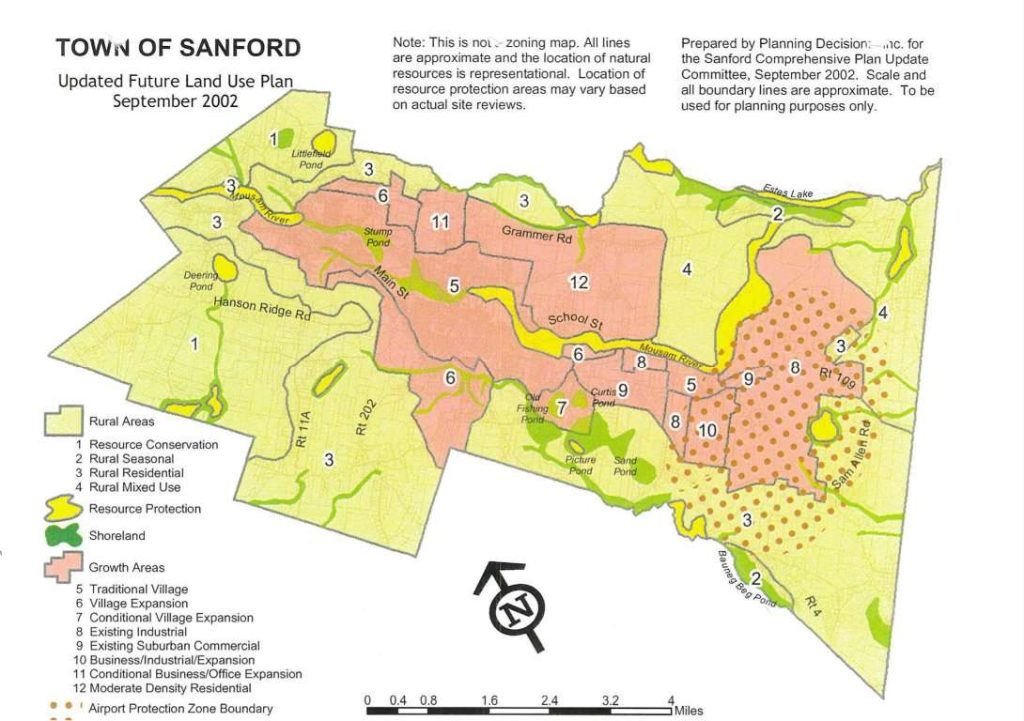City Council Meeting Summary
- February 24th 2024
- City Council
The Anderson Learning Center was once part of the Nasson College Campus.
Photo: Google
By Zendelle Bouchard
The Sanford City Council met Feb. 20, 2024. Councilor Nate Hitchcock was absent with notice; all other members were present.
The minutes of the Feb. 6 regular meeting and executive session were approved.
Mayor’s Report
Mayor Becky Brink thanked Deputy Mayor Maura Herlihy for covering for her while she was away. She also praised the city’s department heads for keeping their budgets as tight as possible this year.
Subcommittee & Committee Reports
Fire Station Feasibility: Councilor Pete Tranchemontagne reported that the working group is recording videos to educate voters about issues surrounding the fire stations. The videos will be shared on the city’s website and social media channels.
Municipal Operations and Property: Councilor Ayn Hanselmann reported that three of the items on the Council’s agenda that night were brought forward by the subcommittee. One item they discussed was not brought forward, which was a request by a homeschooler group for a discount on the rental fees for city property, including playing fields and Veterans Memorial Gym.
Public Safety: Hanselmann reported that the subcommittee got an update from the Sanford Regional Communications Center. She said the SRCC remains well staffed compared to other dispatch centers across the state, in part due to improved morale in Sanford. Updates from the Sanford Fire Department included a presentation on preparedness plans for some of the high-hazard buildings in town, including the abandoned International Woolen Company building. The update from the Sanford Police Department included a traffic update and a report on two grants that have been received. One of the grants will be put toward training costs, while the other will pay for some speed enforcement. The SPD will be continuing its chili cookoff tradition on Feb. 29.
Land Bank: see separate story.
Zoning: Herlihy reported that, in addition to the two items on the Council’s agenda that night, the subcommittee discussed a possible resolution to a potential water quality problem on Sand Pond if a proposed campground is built. Also discussed was the potential traffic problem due to the proposed relocation of the Renaissance Fair to Sunset Road. She also reported that she attended the dedication of Habitat for Humanity’s newest home in Sanford, on Normand Avenue, which she called a win-win for the community and the family who have purchased the home.
City Manager’s Report
Statehouse News: City Manager Steve Buck reported the following:
- The state will fully fund the Property Tax Stabilization Fund for the one year it ran.
- The proposal to increase state reimbursement to municipalities for General Assistance may end up at 80% rather than the proposed 90%. The state currently reimburses communities 70% of GA. Municipalities are still pushing for a statewide database to make it easier to determine if applicants are in the system in another community.
- The new Maine Office of Community Affairs will replace the State Planning Office to assist cities and towns with zoning, regulation, new housing initiatives and the planning process.
- $10M is being allocated to Maine State Housing for an affordable home ownership program, and $16M to privately-operated low-barrier shelters, warming centers, legal services and housing navigation.
- LD1751 is a bill to provide reimbursement for community paramedicine programs like the one Sanford is proposing to establish, which Buck said would be a significant boost to funding the position here, if it passes.
- The city still has not seen any reimbursement from the EMS Stabilization Fund, which the state passed last year. He was originally anticipating Sanford would receive $250,000 from the fund but is now expecting $214,000.
Homelessness: The Homelessness Task Force did not meet due to the President’s Day holiday, but Buck reported the warming shelter in the former Lafayette School is full to capacity. Brink asked if there was a closing date scheduled in the spring. He wasn’t sure but will check into it.
Communications / Presentations
Sanford Arts Commission: Evelyn Nitzberg, founding Chair of the SAC, presented the group’s annual report. She said this year the Art Walks will start at 2 pm and run until sunset. The first Art Walk of the season is planned for April 12. In addition to the Art Walks, three additional arts events are planned for 2024, including Couch to Mic Story Telling; a Sanford on Stage Talent Show; and Art in the Park. The Commission is also working on a video loop of local artists’ works to be exhibited in the window of the Sanford Economic Growth Council on Main Street. The group has a database of 93 Sanford-area artisans, plus musicians. Melissa Alipalo is the new chair for the upcoming year, and meetings are held at the Anderson Learning Center in Springvale.
Public Participation: none
Public Hearings
Airport Rules & Regulations: Allison Navia, manager of the Sanford Seacoast Regional Airport, spoke in favor of changes to the city ordinance outlining rules and regulations for airport use. The ordinance was organized into logical sections and redundancies were deleted. A particular focus was placed on areas where there have been issues in the past, including animals, pedestrians and ground vehicles on the airfield; events and special uses that need permits; trespassing and negligent aircraft operations. No one else spoke in favor or against the changes. Later, under new business, a first reading was held. Comments may be submitted to Navia before the second reading on March 5.
Cannabis License: A public hearing was held on a renewal application submitted by Captains Reserve for a medical marijuana grower/cultivation license at 168 Country Club Rd., Unit D. No one spoke in favor or against. The renewal was granted under the consent agenda.
TIF Districts: Two public hearings were held on amending two Tax Increment Financing Districts to extend them for an additional 15 years. The TIF Districts are for the Sanford Institute for Savings/Partners Bank property and the Rubb Inc. property. Growth Council Director Keith McBride explained that the amendments will allow the funds from the TIFs to be used for affordable housing and homelessness remediation; public safety facilities; environmental improvements and remediation; development and maintenance of recreation trails; expansion or establishment of broadband infrastructure; as well as economic development. TIF Districts allow the city to capture part of the tax revenue on the increased value of property when it is developed and earmark it for specific purposes. McBride said the city captures about $30,000 in revenue from each of the two TIFs annually. The other benefit of TIF Districts is that the increased valuation is sheltered for the duration of the agreement, which improves the funding the city gets from the state.
Affordable Housing: A public hearing was held on a proposed amendment to the zoning ordinance to allow for an affordable housing density bonus. City Planner Erin Moriarty explained that this is the final element required by the state legislature’s passage of LD2003, a law designed to increase opportunities for residential development in response to the housing shortage across the state. The affordable housing density bonus will allow developers to build additional units in the city’s designated growth areas where multi-family residential buildings are allowed, if certain criteria are met. Under new business, the proposed ordinance change had a first reading. The second reading will be held and a vote taken in March.

Sanford’s designated growth areas are shown here in pink.
Photo: City of Sanford.
Urban Zone: A public hearing was held on the proposal to change the front setback from a minimum of 20’ to a maximum of 20’ where no uniform setback relationship exists. Director of Community Development Ian Houseal said the change will help two projects on city-owned land go forward. A second reading will be held in March.
Old Business
Cannabis Renewals: A second reading was held on a proposed ordinance change that will allow license renewals for cannabis businesses, other than retail stores, to be handled administratively rather than needing approval from the City Council. The Council will still approve all new license requests as well as all retail store licenses. City Manager Buck said the change will allow the city to treat businesses with cannabis licenses the same as those with liquor licenses. The Council voted to approve the change. Councilor Tranchemontagne said the fees for cannabis business licenses are way too high and he would like to see them revisited. Councilor Jonathan Martell agreed. Herlihy said that is a separate issue that can be discussed at the subcommittee level before coming before the Council. [Editor’s note: Tranchemontagne owns a medical cannabis dispensary.]
Flavored Tobacco Resolution: see separate story.
Other New Business
Memorial Gym Alcohol: The Council heard a request to approve the sale of alcohol at the Maine Attraction Water Ski Show Team’s March 17 dance/fundraiser. The drinks will be supplied by Pilot’s Cove Café. Councilors Stackpole and Martell were reluctant to approve it but voted in favor along with the rest of the Council. Councilor Hanselmann said she has discovered that the facility needs a permit to allow dancing. City Manager Buck will make sure the permit is obtained.
Market Analysis & Action Plan Matrix: The Council approved an agreement to contract with RKG Associates Inc. for a market analysis and action plan matrix for the city at a cost of $50,400. This is a key component of completing the Comprehensive Plan update, which has been delayed for several years. The analysis will provide crucial data and analytics relevant to market conditions, trends, and opportunities in Sanford; give an outside perspective on Sanford’s position in the region; identify necessary changes to land use patterns and policies to achieve economic stability and community resilience and identify funding opportunities for future revitalization and policy initiatives. RKG was chosen after the Planning Department sent out a formal request for proposals and received six submissions by consultant teams, of which three were interviewed by a selection committee consisting of Planner Erin Moriarty, Planning Director Jamie Cole, Growth Council Director McBride and Public Works Director Matt Hill.
Snowmobile Trail Gates: see separate story.
Anderson Learning Center: The Council authorized funds toward the operation of the Anderson Learning Center in Springvale, which is owned by the city and leased to the Sanford Springvale Development Corporation. City Manager Buck told the Council that the building had positive cash flow when Sanford Community Adult Education and the BRIDGE Program were located there, but since those programs moved to the former Willard School, operating costs have been running at a deficit. A business originally planned to locate there, but that fell through. The SSDC now plans to lease part of the space to the Area Agency on Aging for an adult day care center for people with memory deficits. This is a much-needed service, since Sanford residents who need this program currently must go to Biddeford. The Sanford Arts Commission has also just rented space for a co-op arts center, so Buck expects the building to return to a positive cash flow soon.
Council Member Comments
Hanselmann expressed her gratitude to city staff who participate in Council meetings after their regular workday is done. Martell said he appreciated all the community members who have reached out to him with comments and feedback regarding the budget. Herlihy encouraged Sanford residents who are looking to purchase their first home to reach out to Habitat for Humanity to see if they qualify.






